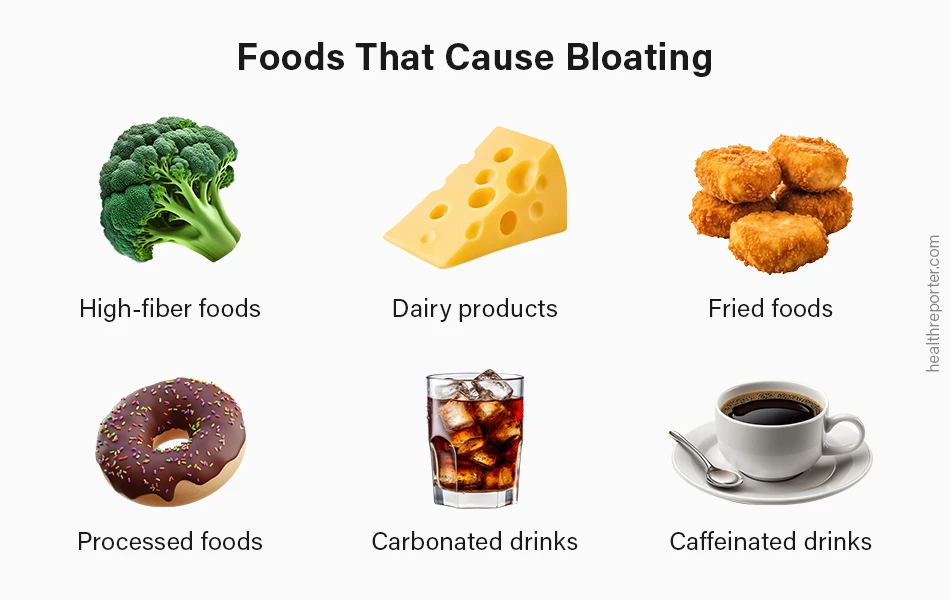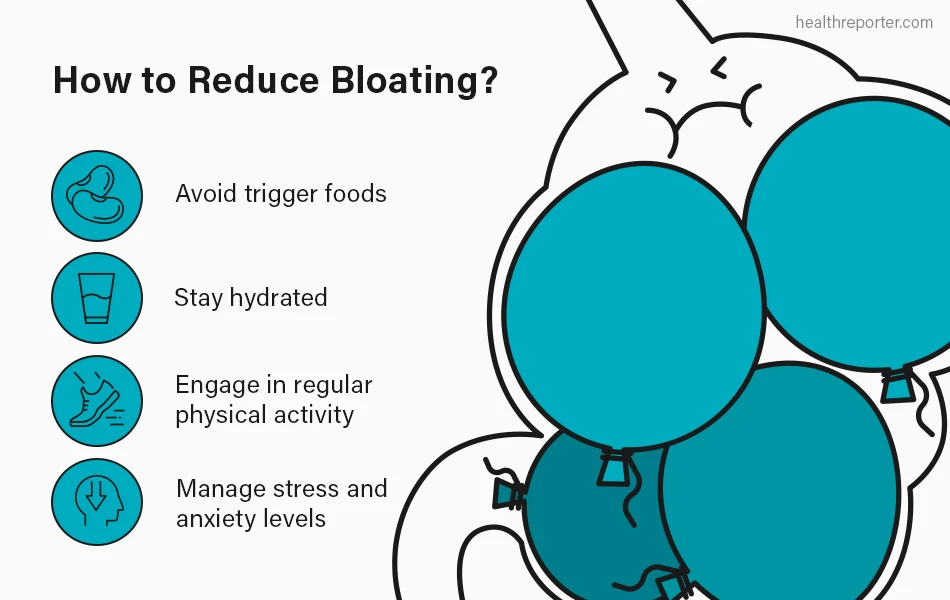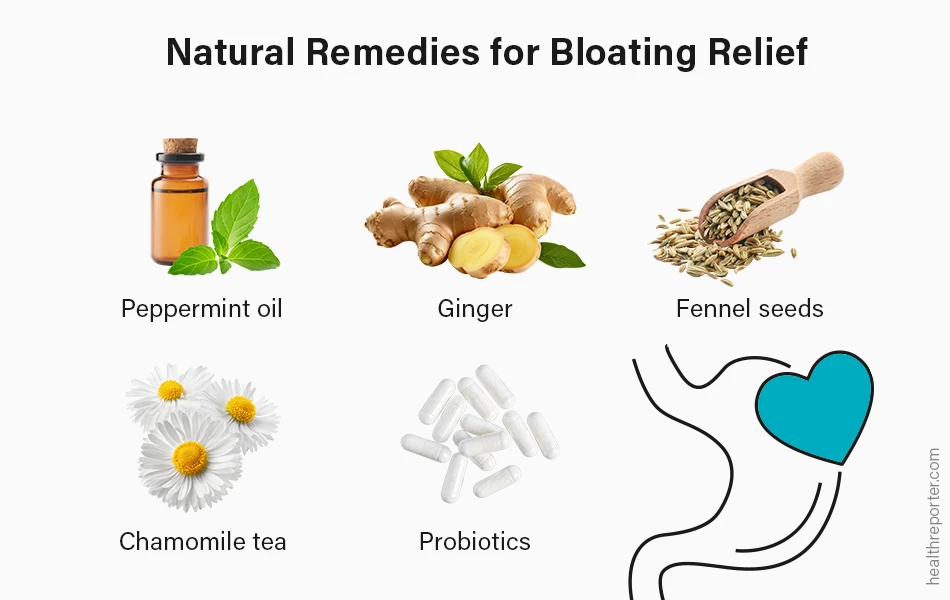Bloating: The Complete Guide to Tummy Troubles
Abdominal pain can wreak havoc on your daily life, but what causes it, and how can you beat the bloat?

Is your belly ballooning after meals? Is a feeling of fullness in your abdomen causing you distress?
When you overfill or rush your digestive system, stomach pain is almost a given. For some, however, discomfort occurs more often than on these occasions. It can happen so often that it affects your quality of life.
If this sounds like you, read on to discover all you need to know about bloating and what you can do to prevent it.
What Is Bloating?
Bloating is a common digestive issue that causes an uncomfortable feeling of fullness and pressure in your stomach.
Sometimes it can cause abdominal distention – where your belly visibly expands. It can appear swollen as your abdomen feels hard and tight to the touch.
Abdominal bloating occurs when the gastrointestinal system fills with air or gas. There are a number of causes, from dietary choices to mood changes. Temporary bloating is normal and happens to everyone, but chronic bloating symptoms may indicate an underlying condition.
What does bloating feel like?
Bloating is usually described as a sensation of fullness, tightness, or swelling in the abdomen. When someone experiences bloating, their abdomen may feel distended or appear larger than usual. In addition to discomfort and pressure, a gassy sensation may accompany it.
In addition to bloating, some people may also experience pain or cramping. Bloating’s severity and duration may vary depending on its underlying cause.
Excess gas and bloating often occur together, so you might need to pass more wind than usual to release the tension.
Common Causes of Bloating
Gas production is part of the body’s natural function, but excessive amounts of intestinal gas can lead you to experience bloating. There are a few things that initiate bloating, and discovering the cause of yours is key to addressing and countering the problem.
Here are 8 common bloating triggers:
#1 Digestive issues
The underlying cause could be a digestive disorder that requires treatment. Bloating is linked to functional gastrointestinal disorders, including irritable bowel syndrome (IBS) and gastroesophageal reflux disease. It’s also a recurring symptom of inflammatory bowel disease.
#2 Swallowing air
When you swallow air, it enters the gastrointestinal tract, causing digestive distress. To stop yourself from swallowing excess air, you should avoid chewing gum, eating hard candy, eating quickly, and smoking. These practices encourage extra air to enter your body.
#3 Overeating
Consuming large amounts of food at once causes your stomach to stretch. This stretching can cause bloating and discomfort in the abdominal area. Overeating often involves consuming high-fat and high-sodium foods, which can also contribute to bloating and even weight gain.
Large meals may cause additional bloating due to the digestive process required to digest them. You can reduce the likelihood of bloating by practicing mindful eating, listening to your body’s hunger and fullness cues, and avoiding excessive portions.
#4 Food intolerances
Gluten, lactose, wheat, and fructose intolerance are food intolerances that may cause bloating. Other foods containing certain compounds that ferment in the colon can also be to blame, such as FODMAP foods and sugar alcohols.
#5 Constipation
For many people, bloating is often a side effect of constipation. This is because stool trapped in the colon for a prolonged period can impair gas evacuation and slow intestinal transit time. Without a release, the gas can accumulate in the abdomen and cause pain.
#6 Hormonal changes
When estrogen levels rise during the menstrual cycle, the body retains more water, causing bloating and heaviness. It is commonly experienced during premenstrual syndrome (PMS) and during menstruation. Moreover, hormonal changes can slow digestion and cause bloating and discomfort by slowing down the movement of the digestive tract.
Once hormone levels stabilize, hormonal bloating usually resolves. By maintaining a healthy diet, staying hydrated, exercising regularly, and managing stress, hormonal bloating symptoms can be alleviated.
#7 Stress and anxiety
Stress and anxiety can affect more than your mood. They can mess with your physical health, and that includes your digestive system. These negative feelings can slow digestive processes, causing bloating and constipation, or accelerate them, causing diarrhea.
#8 Infections
Bloating can be a symptom of an infection. It’s not uncommon to develop bloating following a stomach bug or virus, as the bacteria in the gut flora falls off balance. The inflammation from infections can also cause bloating, which is why it often accompanies urinary tract infections.
An imbalance of bacteria living in the small intestine can also cause small intestinal bacterial overgrowth (SIBO) – another bloating trigger.
Foods That Cause Bloating

Certain foods are notorious for triggering gas and bloating, while problems with others can indicate allergies, intolerances, or sensitivities. The following 6 food and drink types are the most popular culprits associated with bloating symptoms and other digestive problems.
#1 High-fiber foods
You might assume that the incredible discomfort must result from poor food choices. This is not the case, as consuming a high-fiber diet rich in foods like beans, lentils, oats, and cruciferous vegetables can quickly produce more gas and inflate your belly.
You’ll probably feel bloated if you’ve suddenly increased your fiber intake with these foods or fiber supplements. Despite packing numerous health benefits, you might need to rethink your diet. Raising your intake gradually can help you avoid severe bloating.
#2 Dairy products
You might have lactose intolerance if you have bloating, gas, or diarrhea after consuming dairy. With lactose intolerance, your body is unable to digest lactose properly – the type of sugar present in dairy products.
#3 Fried foods
Fried foods taste good because they are high in fats. Like other fatty foods, they can slow the emptying of your stomach. When food remains in your digestive tract for an extended period, it can make you feel bloated and uncomfortable.
#4 Processed foods
Highly-processed foods can create bloating due to their contents. For instance, artificial sweeteners contain compounds that are hard to digest, while high amounts of sodium can cause your body to retain water, making you bloat.
These foods are often carb-heavy, which is a problem if you have carbohydrate malabsorption – an inability to absorb dietary carbohydrates that causes abdominal cramps, bloating, diarrhea, and flatulence.
#5 Carbonated drinks
Drinking carbonated beverages can easily bloat your belly.
These drinks are fizzy because they contain carbon dioxide gas. When you drink them, you consume the gas bubbles, which get trapped in your system. For this reason, carbonated drinks are a primary offender.
#6 Caffeinated drinks
For some, drinking coffee and other caffeinated drinks triggers a bowel movement. For others, it results in bloating and indigestion. This is because caffeine stimulates stomach acid secretion and irritates the stomach lining, primarily in people who are caffeine sensitive.
Symptoms of Bloating
Bloating is characterized by discomfort in your tummy, but it can come with additional symptoms that might leave you uncertain. Let’s look at the common symptoms associated with bloating in more detail.
#1 Abdominal discomfort and pain
First and foremost, you’ll notice abdominal symptoms like abdominal pain and discomfort. This is a telltale sign that you are suffering from bloating. The problem is in your digestive tract, as trapped air or gas fills the abdomen, creating the unpleasant feeling of swelling.
#2 Excessive gas
Too much gas in your gut is the primary cause of bloating. With more gas, you might notice that you have more flatulence than usual. When bloating hits, releasing the excess gas when the urge comes can provide relief and help your belly return to its former state.
#3 Changes in bowel movements
Have your bowel habits changed? You might not have made the connection, but bloating is linked to other symptoms that arise in the bathroom. Bloating and constipation often go hand in hand.
Alternatively, diarrhea can accompany bloating, particularly in people with irritable bowel syndrome who are more sensitive to intestinal gas. It’s not uncommon to experience a collection of symptoms, including bloating, cramping, constipation, and diarrhea, with IBS.
#4 Acid reflux or heartburn
Acid reflux, gas, and bloating often co-occur. This is especially true when belching accompanies bloating, as a build-up of intestinal gas can trigger all three symptoms.
How to Reduce Bloating? 4 Ways to Help Your Tummy

It’s not easy to avoid bloating entirely, but you can take action to reduce the frequency and severity of your episodes. After identifying any specific triggers, you can make the appropriate changes to your diet and eating habits.
To fight bloating further, you can create new habits that keep your digestive system functioning nicely.
The following tips should help:
#1 Avoid trigger foods
After assessing the list of foods that may cause bloating, you can note whether your bloating occurs after eating certain things. It can help to keep a food diary to track your symptoms. If you’re still unsure, you can begin to test by means of elimination.
Once you identify the trigger, you can remove it from your diet and continue to eat a variety of foods without worrying about your belly.
#2 Stay hydrated
Fluids keep your digestive tract operating smoothly. Water is necessary for healthy bowel movements, preventing constipation, and keeping bloating at bay. It also flushes out excess fluids to relieve water retention, which can cause pain and puffiness in the abdominal region.
#3 Engage in regular physical activity
Staying active increases intestinal activity and blood flow to the muscles in the GI tract. This allows food to pass through easier and keeps things moving along nicely. When your system is happy, it helps to prevent constipation, bloating, and other troubles.
Exercising when bloated can deflate your belly by expelling the trapped gas from your bowels. You can stick to light movements, like going for a walk after a meal.
#4 Manage stress and anxiety levels
Managing your stress and anxiety levels can help to restore normal digestive function. Try journaling, meditation, stretching, getting more active, and connecting with others to calm your mind and help yourself to relax.
Natural Remedies for Bloating Relief

After eliminating trigger foods, upping your water intake, and eating more slowly, you can expect to see improvements in your digestive health. But that doesn’t mean you’ll never feel bloated again. Bloating can happen regardless of your effort to fight it.
It can help to keep some natural remedies in mind to deliver relief the next time you experience bloating. Try introducing the following to your diet to improve symptoms:
#1 Peppermint oil
For centuries, peppermint oil has been used to aid gastrointestinal ailments. Research supports the use of peppermint oil for abdominal pain, irritable bowel syndrome, and functional dyspepsia.
#2 Ginger
Ginger has known gastrointestinal effects and can therefore help counter various stomach-related ailments. Its benefits include calming nausea and vomiting, treating indigestion, and relieving cramping, gas, and bloating.
#3 Fennel seeds
Fennel is an aromatic plant and herbal medicine. The seeds are often used as a natural remedy against digestive ailments like bloating and flatulence. They work by reducing inflammation, soothing swelling, and helping to relax the intestinal muscles.
#4 Chamomile tea
Did you know herbal teas can be great for bloating? Calming chamomile is one of the best teas to soothe your stomach. The dried flowers contain terpenoids and flavonoids that offer medicinal benefits like decreasing inflammation and relieving gastrointestinal disorders.
#5 Probiotics
Probiotics are live microorganisms that live in your gut, and consuming them via foods and supplements can help restore balance to the gut microbiome. Since an imbalance can upset your digestive system, probiotics may help with bloating, gas, and other digestive woes.
Several probiotic strains, including Bifidobacterium infantis and lactobacillus acidophilus, are known to alleviate abdominal pain, distention, flatulence, the urgency to move the bowels, and other IBS symptoms.
You could take a strain-specific probiotic supplement or add foods like kefir and plain yogurt to your diet.
When to Seek Medical Attention
You’re going to feel bloated from time to time, but it’s vital to get medical help if it becomes necessary. According to the American College of Gastroenterology, an increase in frequency or symptom severity should encourage medical attention.
Talk to your doctor if you’re experiencing any of the following:
- Bloating for three weeks or more
- Regular bloating (several times a month)
- Bloating despite making dietary changes
- Bloating that stops you from moving or partaking in your usual activities
- Bloating alongside vomiting, diarrhea, and constipation
- Bloating coupled with blood in your stool
- Unintentional weight loss
Seek emergency medical care if any of the following occur:
- Severe stomach pain
- A high fever
- Blood in your vomit
- Black or bloody stool
- Chest pain
FAQs
Gentle abdomen massage and light exercises like walking and yoga poses can help to alleviate bloating. You can also try at-home remedies, such as peppermint oil and herbal tea. Chamomile and ginger teas are particularly good for combating digestive distress.
You can tell if you are bloated by looking out for these signs: a feeling of fullness and pressure in your belly, discomfort and stomach pain, more flatulence than usual, changes in toilet habits, and acid reflux or heartburn.
The number one cause of bloating is having too much intestinal gas. Excess gas can occur when you swallow air, overeat, drink fizzy beverages, and eat too many fiber-rich foods. You’ll often experience gas and bloating together.
A Word From an MD
Bloating is a prevalent condition in the community. In a sample study of almost 89,000 Americans, 1 in 7 people reported that they had bloating symptoms in the past week.
As it’s common, it can be difficult to determine if your bloating is healthy or a cause for concern. Frequent episodes of gas and bloating may suggest an underlying problem, ranging from food intolerances to chronic gastrointestinal disorders.
If bloating persists despite lifestyle changes like altering your diet and managing stress, seek medical care. Your doctor or healthcare team can assess your symptoms more closely to rule out or diagnose any health conditions.
Conclusion
Most often, bloating is your body’s natural response to excess gas production. However, if you’re constantly battling with bloating, it might be something more. A handful of health conditions result in bloating signs.
Instead of ignoring the problem, book a visit to your doctor. The sooner you get to the bottom of chronic bloating, the sooner you can return to living comfortably.

















































 Select your language:
Select your language: 









